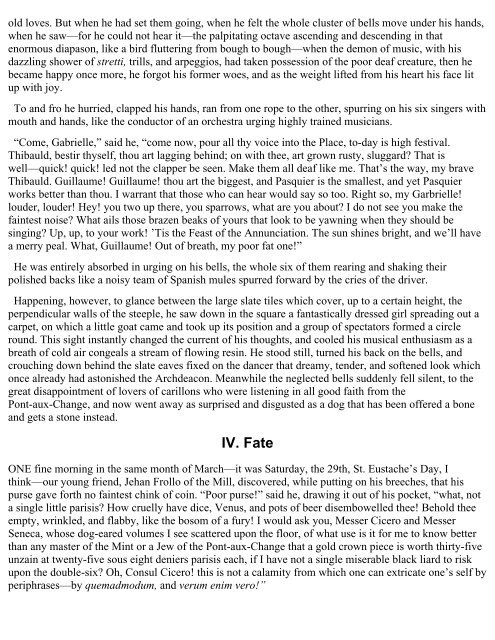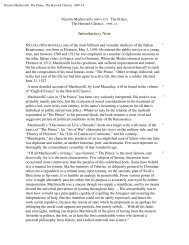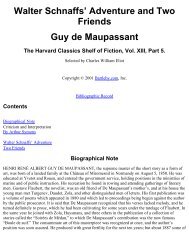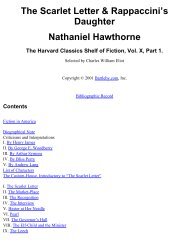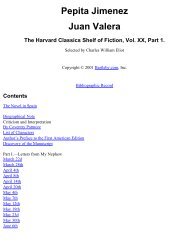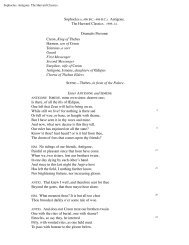Notre Dame de Paris - Bartleby.com
Notre Dame de Paris - Bartleby.com
Notre Dame de Paris - Bartleby.com
You also want an ePaper? Increase the reach of your titles
YUMPU automatically turns print PDFs into web optimized ePapers that Google loves.
old loves. But when he had set them going, when he felt the whole cluster of bells move un<strong>de</strong>r his hands,<br />
when he saw—for he could not hear it—the palpitating octave ascending and <strong>de</strong>scending in that<br />
enormous diapason, like a bird fluttering from bough to bough—when the <strong>de</strong>mon of music, with his<br />
dazzling shower of stretti, trills, and arpeggios, had taken possession of the poor <strong>de</strong>af creature, then he<br />
became happy once more, he forgot his former woes, and as the weight lifted from his heart his face lit<br />
up with joy.<br />
To and fro he hurried, clapped his hands, ran from one rope to the other, spurring on his six singers with<br />
mouth and hands, like the conductor of an orchestra urging highly trained musicians.<br />
“Come, Gabrielle,” said he, “<strong>com</strong>e now, pour all thy voice into the Place, to-day is high festival.<br />
Thibauld, bestir thyself, thou art lagging behind; on with thee, art grown rusty, sluggard? That is<br />
well—quick! quick! led not the clapper be seen. Make them all <strong>de</strong>af like me. That’s the way, my brave<br />
Thibauld. Guillaume! Guillaume! thou art the biggest, and Pasquier is the smallest, and yet Pasquier<br />
works better than thou. I warrant that those who can hear would say so too. Right so, my Garbrielle!<br />
lou<strong>de</strong>r, lou<strong>de</strong>r! Hey! you two up there, you sparrows, what are you about? I do not see you make the<br />
faintest noise? What ails those brazen beaks of yours that look to be yawning when they should be<br />
singing? Up, up, to your work! ’Tis the Feast of the Annunciation. The sun shines bright, and we’ll have<br />
a merry peal. What, Guillaume! Out of breath, my poor fat one!”<br />
He was entirely absorbed in urging on his bells, the whole six of them rearing and shaking their<br />
polished backs like a noisy team of Spanish mules spurred forward by the cries of the driver.<br />
Happening, however, to glance between the large slate tiles which cover, up to a certain height, the<br />
perpendicular walls of the steeple, he saw down in the square a fantastically dressed girl spreading out a<br />
carpet, on which a little goat came and took up its position and a group of spectators formed a circle<br />
round. This sight instantly changed the current of his thoughts, and cooled his musical enthusiasm as a<br />
breath of cold air congeals a stream of flowing resin. He stood still, turned his back on the bells, and<br />
crouching down behind the slate eaves fixed on the dancer that dreamy, ten<strong>de</strong>r, and softened look which<br />
once already had astonished the Arch<strong>de</strong>acon. Meanwhile the neglected bells sud<strong>de</strong>nly fell silent, to the<br />
great disappointment of lovers of carillons who were listening in all good faith from the<br />
Pont-aux-Change, and now went away as surprised and disgusted as a dog that has been offered a bone<br />
and gets a stone instead.<br />
IV. Fate<br />
ONE fine morning in the same month of March—it was Saturday, the 29th, St. Eustache’s Day, I<br />
think—our young friend, Jehan Frollo of the Mill, discovered, while putting on his breeches, that his<br />
purse gave forth no faintest chink of coin. “Poor purse!” said he, drawing it out of his pocket, “what, not<br />
a single little parisis? How cruelly have dice, Venus, and pots of beer disembowelled thee! Behold thee<br />
empty, wrinkled, and flabby, like the bosom of a fury! I would ask you, Messer Cicero and Messer<br />
Seneca, whose dog-eared volumes I see scattered upon the floor, of what use is it for me to know better<br />
than any master of the Mint or a Jew of the Pont-aux-Change that a gold crown piece is worth thirty-five<br />
unzain at twenty-five sous eight <strong>de</strong>niers parisis each, if I have not a single miserable black liard to risk<br />
upon the double-six? Oh, Consul Cicero! this is not a calamity from which one can extricate one’s self by<br />
periphrases—by quemadmodum, and verum enim vero!”


